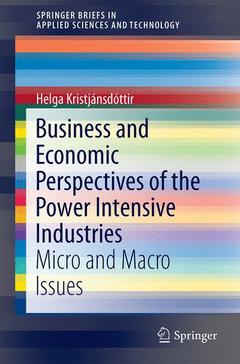Description
Economics and Power-intensive Industries, 2014
Micro and Macro Issues
SpringerBriefs in Applied Sciences and Technology Series
Author: Kristjánsdóttir Helga
Language: English
Subjects for Economics and Power-intensive Industries:
77 p. · 15.5x23.5 cm · Paperback
Description
/li>Contents
/li>Biography
/li>Comment
/li>
Delving into the connections between renewable energy and economics on an international level, this book focuses specifically on hydropower and geothermal power production for use in the power intensive industry. It takes readily available government and international statistics to provide insight into how businesses and economists can interpret the factors that influence the growth of power intensive industries. It also discusses the CarbFix and SulFix projects that involve the injection of hydrogen sulphide (H2S), and carbon dioxide (CO2) back to reservoir as an emission reduction method. With improved engineering processes, both types of power generation are increasingly subject to economies of scale. These exciting technological developments have a great potential to change the way the world works, as the economy continues to rely so heavily on energy to drive production. Green energy is without a question going to be a major factor in our future, so studying it at its nascence is particularly exciting. This book is intended for academic researchers and students interested in current economic and environmental hot topics, as well as people interested in the inner workings of a possible new investment opportunity.
Introduction.- Microeconomic and Macroeconomic Issues in the Power Intensive Industry.- The Power Intensive Industry, from the International Economic Perspective.- The Hydropower Application.- The Geothermal Application.- The Importance of Renewable Energy for the Power Intensive Industry, from an Economic Perspective.- The Carbfix Procedure.- The Sulfix Procedure.
Dr. Helga Kristjánsdóttir completed PhD in economics at the University of Iceland in 2004. Prior to that she obtained MS in economics from the Katholieke Universiteit Leuven Belgium in 2000, and an MBA from Boston College in 1995.
Helga has worked in stock brokering and management consultancy. Helga’s teaching experience includes classes in international economics, statistics and energy economics at the undergraduate and graduate levels. Her research covers publication of several papers in peer international journals. Her areas of expertise are primarily in the aluminum industry, foreign direct investment, and renewable energy.




